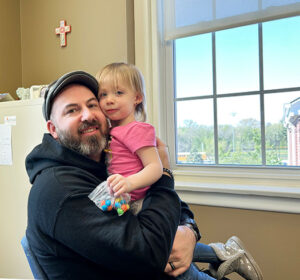
This photo illustration shows words associated with mental health. May is Mental Health Awareness Month. The Catholic Messenger is addressing the issue in stories and editorials this month.
By Barb Arland-Fye
The Catholic Messenger
For Deacon Gary Johnson of Divine Mercy Parish-Burlington and Gray Reed of St. Paul the Apostle Parish-Davenport, raising awareness about mental illness extends beyond Mental Health

Awareness Month in May. Each one strives to raise awareness, one through his diaconal ministry and the other through his lived experience with mental illness.
One in five adults in the U.S. (approximately 600,000 Iowans) experience mental illness each year, according to NAMI, “the nation’s largest grassroots mental health organization dedicated to building better lives for the millions of Americans affected by mental illness” (nami.org).
“I know from personal experience that unless we encounter mental illness in our family or circle of friends, it is very easy to not be aware of mental health as an issue,” said Deacon Johnson, whose ministry includes mental health.
“Through my encounters as a member of the NAMI Southeast Iowa sharing group, I have met people that are getting by, but struggle every day to keep things together and suffer in ways that are difficult to witness. Yet they continue to find ways to keep moving forward, taking care of what they need to do on a day-to-day basis, living life while dealing with their mental health challenges.”
NAMI emphasizes removing stigma from the issue of mental health, Deacon Johnson said, which remains a challenge. Some people experiencing mental illness don’t seek help because they fear other people’s perception of them. Less than one-half receive treatment, NAMI states.
“Mental illness is harder to understand compared to physical illnesses that are often very visible. This may cause people to be fearful and step away from offering assistance. Compassion, empathy and a listening ear are the first steps when assisting someone with a mental health struggle,” Deacon Johnson said.
His service as a board member of NAMI Southeast Iowa, based in Burlington, and his visits with clients of Transitions DMC, a 13-bed homeless shelter in Burlington, have raised his awareness about mental health needs.
Transitions, he said, is “more accurately a ‘way-station’ for those who find themselves in need of housing but have a goal of being re-established in the community.” However, some of the clients may struggle to live on their own because of mental disability or mental illness and would benefit from “more residential-style facilities.”
“From my conversations with the NAMI group, it appears that there is a shortage of mental health professionals, whether they be counselors or licensed therapists, psychiatrists, etc. This is because there is a lack of qualified professionals that would serve in this state, especially in rural areas,” Deacon Johnson said.
Access to mental health professionals for people living in smaller-size communities is challenging, says Terri Elliott, president of the NAMI Southeast Iowa board. The retired traveling nurse sees inconsistencies in distribution of mental health services and inequitable reimbursement for Medicare and Medicaid. She believes more financial and training incentives are necessary to encourage mental health care providers to practice in less-populated Iowa communities.
Some efforts are underway. Last year, according to a Radio Iowa report, Gov. Kim Reynolds signed into law two bills to address treatment options for Iowans seeking mental health services. “One bill sets up a loan repayment program for students who agree to work in an underserved area of Iowa after they get a degree in the mental health field. Representative Timi Brown-Powers of Waterloo said it will hopefully boost the number of mental health professionals working in rural Iowa” (https:// tinyurl.com/yhr58tsm).
Brown-Powers had said during House debate earlier that year “we are only meeting 40% of the need of mental health folks in the state of Iowa, so this bill through student aid, I hope, will expand feet on the ground, hands in the air for our folks with mental illness,” (Radio Iowa report).
This year, NAMI Iowa said the Iowa Legislature approved $13 million in increased funding toward Medicaid reimbursement rates for providers of mental health and substance abuse services. That figure includes “$7 million in increases for mental health therapists, $3 million for other mental health professionals and $3 million for substance abuse disorder providers. Additionally, lawmakers increased funding for Iowa’s Mental Health and Disability Services (MHDS) regions and maintained the $14.6 million increase to home and community-based service providers. Money also is being set aside to address youth suicide prevention, a rotation of intern psychologists into mental health deserts and funding for psychiatric residencies that serve six underserved areas in the state. Also, the legislators approved funding for training physician assistants and nurse practitioners.
Gray Reed, who lives in Davenport, has been fortunate in accessing mental health services and has insurance to cover it. He previously volunteered and worked as a first-responder but depression caused him to step away. Now he strives to reach out to first-responders through a support group he

Gray Reed holds his daughter Kinsley.
founded called “Public Safety Preservation” (https://publicsafetypreservation.org).
The 38-year-old husband and father of a 2-year-old daughter began seeking treatment for anxiety in his mid-20s. He worked as a police reserve officer and later as correctional officer before he received a diagnosis of Post-traumatic stress disorder (PTSD) two years ago, he said. Later, he was diagnosed with major depression.
“I felt so helpless leaving my career,” Reed said. “I knew at the time I couldn’t be the only one that had these mental health obstacles. I wanted to reach out to first-responders whether locally or nationally.” He values his Catholic faith and believes his efforts to reach out to others dealing with mental health issues is one way to “strive to do Christ’s will, even though I am imperfect.”
Mental health resources
Visit NAMI Iowa (namiiowa.org), National Catholic Partnership on Disability (https://ncpd.org/disability-ministry/mental-illness), Substance Abuse and Mental Health Services Administration (samhsa.gov), National Institute of Mental Illness (nimh.nih.gov) and Make It OK (makeitok.org/IOWA/).











